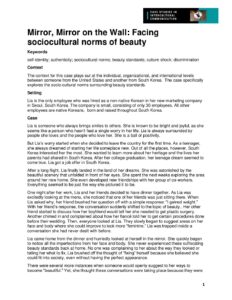Mirror, Mirror on the Wall: Facing sociocultural norms of beauty
Keywords
self-identity; authenticity; sociocultural norms; beauty standards; culture shock; discrimination
Context
The context for this case plays out at the individual, organizational, and international levels between someone from the United States and another from South Korea. The case specifically explores the socio-cultural norms surrounding beauty standards.
Setting
Lia is the only employee who was hired as a non-native Korean in her new marketing company in Seoul, South Korea. The company is small, consisting of only 30 employees. All other employees are native Koreans, born and raised throughout South Korea.
Case
Lia is someone who always brings smiles to others. She is known to be bright and joyful, as she seems like a person who hasn’t had a single worry in her life. Lia is always surrounded by people she loves and the people who love her. She is a ball of positivity.
But Lia’s worry started when she decided to leave the country for the first time. As a teenager, she always dreamed of starting her life someplace new. Out of all the places, however, South Korea interested her the most. She wanted to learn more about her heritage and the lives her parents had shared in South Korea. After her college graduation, her teenage dream seemed to come true. Lia got a job offer in South Korea.
After a long flight, Lia finally landed in the land of her dreams. She was astonished by the beautiful scenery that unfolded in front of her eyes. She spent the next weeks exploring the area around her new home. She even developed new friendships with her group of co-workers. Everything seemed to be just the way she pictured it to be.
One night after her work, Lia and her friends decided to have dinner together. As Lia was excitedly looking at the menu, she noticed that one of her friends was just sitting there. When Lia asked why, her friend brushed her question off with a simple response: “I gained weight.” With her friend’s response, the conversation suddenly shifted to the topic of beauty.. Her other friend started to discuss how her boyfriend would tell her she needed to get plastic surgery. Another chimed in and complained about how her fiancé told her to get certain procedures done before their wedding. Then, everyone looked at Lia. They slowly began to suggest areas on her face and body where she could improve to look more “feminine.” Lia was trapped inside a conversation she had never dealt with before.
Lia came home from the dinner and hurriedly looked at herself in the mirror. She quickly began to notice all the imperfections from her face and body. She never experienced these suffocating beauty standards back at home. No one was complaining to her about the way they looked or telling her what to fix. Lia brushed off the thought of “fixing” herself because she believed she could fit into society, even without having the perfect appearance.
There were several more instances when someone would openly suggest to her ways to become “beautiful.” Yet, she thought these conversations were taking place because they were casual and friendly conversations between friends and people she trusted. However, one point during her time in South Korea, she faced the biggest crisis of her professional career.
It was during her lunch break when her supervisor called her to his office. After months of working, she thought this was her chance to be recognized for her hard work. When she entered his room, she found herself in front of a middle-aged man with a stern look on his face. He quietly opened his mouth to ask her a simple question: “Do you look at yourself in the mirror?” Lia’s face immediately turned red and her eyes filled with tears of shame. Lia didn’t know how to respond to the question and she began to remind herself of all the times she compared herself to others. It repeatedly crushed her when her coworkers and friends consistently suggested to her all the surgeries and procedures she could get done. She believed that as long as she was acknowledged for her professional skills and efforts, she would be able to mix into the society. When Lia finally got the courage to answer him, his response stunned her. Her superior smiled faintly and told her that he was just looking out for her as her supervisor.
Discussion Questions
As you consider this case, discuss:
- How does Lia experience the “culture shock?”
- What aspects of Lia’s sojourn created confusion or complexities with the interactions between her coworkers?
- How do our cultural upbringing influence how we see ourselves in the world? How do we make sense of conformity?
- How does Lia maintain authenticity while still being successful in adapting to the new societal norms and expectations in South Korea?
- How would Lia seek out support after the encounter with her supervisor to better understand the cultural norms? When do we need to adapt or tackle foreign behaviors?
Additional Resources
Additional recommended resources to explore the central themes in this case are available.
- Cho, K. (2020, May 22). The Destructive Effects of South Korea’s Beauty Standards.
- Stump & Associates. (2018, May 3). How Not To Lose Your Cultural Identity While Living In A New Country.
- Kuhn, A. (2019, May 6). South Korean Women ‘Escape The Corset’ And Reject Their Country’sBeautyIdeals.
- Roucek, J. (1944). Ideology as a Means of Social Control, III. The American Journal of Economics and Sociology, 3 ( 3), 357-369. Retrieved October 3, 2020, from jstor.org/stable/3483779.
- Stevenson, A. (2018, November 23). South Korea Loves Plastic Surgery and Makeup. Some Women Want to Change That. The New York Times.
Corresponding Author
Park, Hae Lim, American University, Washington, D.C., United States of America. Email: hp3056a@student.american.edu


